What Are Porcelain Tiles? Uses, Pros, Cons, & FAQ
-

- Last updated:
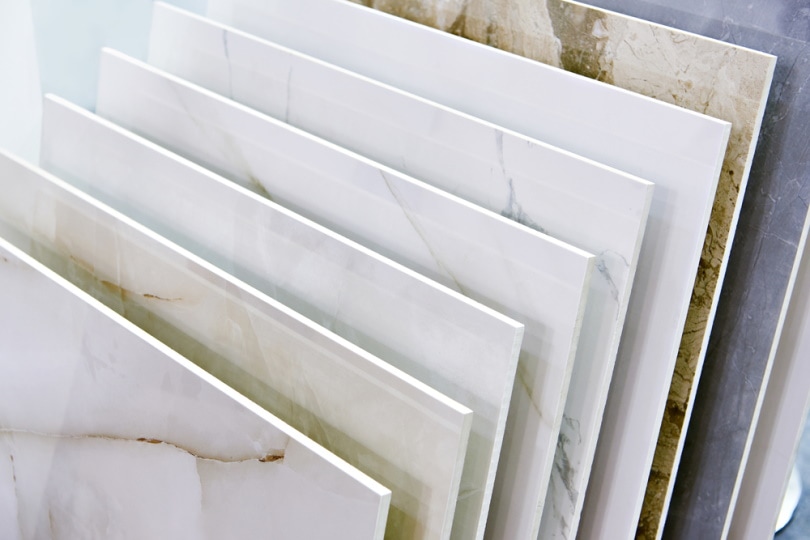
Porcelain tiles are a kind of ceramic tile that is made from porcelain clay. They are fired at a higher temperature than other ceramic tiles, which makes them more dense and less porous. Porcelain tiles are available in various shapes, sizes, and colors.
There are several things to consider when choosing porcelain tiles for your home. First, you need to decide what type of look you are going for. Do you want a traditional look or something more modern? There are also many different colors and patterns that you can choose from.
To help you choose the right tile for your home, explore the discussion below for further information and insight.
How Does It Work?
Porcelain tile is made by firing clay and other minerals at very high temperatures. This process makes the tile denser and less porous than other types of tiles, which means it is less likely to absorb stains and moisture. Porcelain tile is also harder and more durable than ceramic tile, making it a good choice for areas with high traffic or areas that are subject to wear and tear.
There are two types of porcelain tiles: glazed and unglazed. Glazed tiles have a smooth, shiny surface that is sealed with a clear or colored glaze. Unglazed tiles have a matte finish, and their color goes all the way through the tile.
Porcelain tiles come in various sizes, colors, and shapes. They may be used for flooring, walls, countertops, and backsplashes.
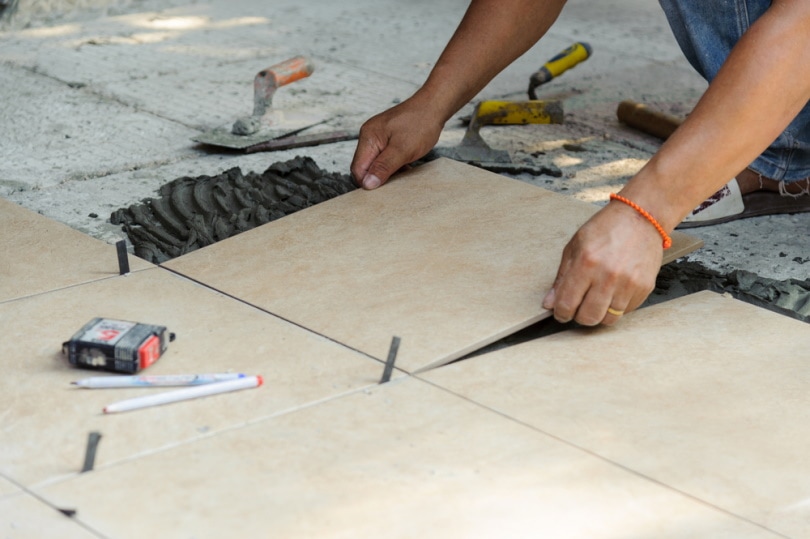
What Are the Different Types of Porcelain Tiles?
There are a few different types of porcelain tiles, each possessing unique benefits.
- Glazed Porcelain Tiles: These tiles have a glass-like finish that is stain and water-resistant. They are available in various colors and patterns, making them a great option for both indoor and outdoor use.
- Unglazed Porcelain Tiles: These tiles are denser and more durable than glazed options, making them ideal for high-traffic spaces. They are also slip-resistant, making them a good choice for wet areas like showers and pools. Unglazed porcelain tiles come in limited ranges of colors, typically earth tones.
- Porcelain Wood Tiles: These tiles are designed to resemble real wood, making them a popular choice for floors and walls. They are available in various colors and patterns and can even be stained to match your existing woodwork. Porcelain tiles are available in a wide range of sizes, from small mosaic tiles to large format tiles. The size you choose will depend on the look you want to achieve as well as the area you are tiling. Some of the most popular porcelain tile sizes include:
- Mosaic Tiles: These small tiles can make intricate patterns and designs. They are typically used on floors and walls as accents or in areas where a larger tile wouldn’t be practical.
- Small Format Tiles: These tiles are typically between 4–6 inches and are a popular choice for backsplashes, fireplaces, and small bathrooms.
- Large Format Tiles: These tiles are typically between 12–18 inches and are well suited for large areas like kitchens, living rooms, and patios. Porcelain tiles are a versatile option that work in various applications. Whether you want to make a statement with mosaic tiles or keep things simple with large format tiles, there is a porcelain tile that will fit your needs.
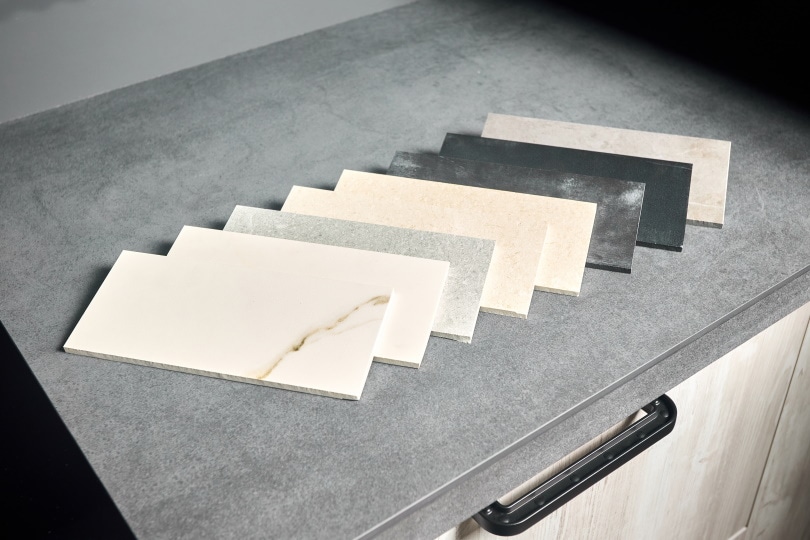
Where Is It Used?
Porcelain tile is made from porcelain clay. It is fired at a high temperature, making it harder and more durable than other kinds of ceramic tile. Porcelain tile is available in glazed and unglazed varieties.
Glazed porcelain tiles have a smooth, glossy surface that is easy to clean. They are available in various colors and patterns. Unglazed porcelain tiles have a matte finish and are more slip-resistant than glazed tiles. They’re often used for flooring in commercial applications such as restaurants, hotels, and hospitals.
Porcelain tile may be used on walls and floors in both residential and commercial settings. It is a popular choice for kitchen and bathroom backsplashes, countertops, and flooring. Porcelain tile is also commonly used in entryways, Mudrooms, and laundry room.
Porcelain tile is a long-lasting and durable material that is easy to care for. When properly sealed, porcelain tile is stain-resistant and can withstand heavy traffic. Porcelain tile is offered in many finishes, including gloss, matte, and textured. With so many options offered, you can create a stunning look for your space.
If you are looking for a tile that’s both durable and beautiful, porcelain tile may be the right choice for you. Thanks to its many benefits, porcelain tile is a popular choice for homeowners and businesses alike.
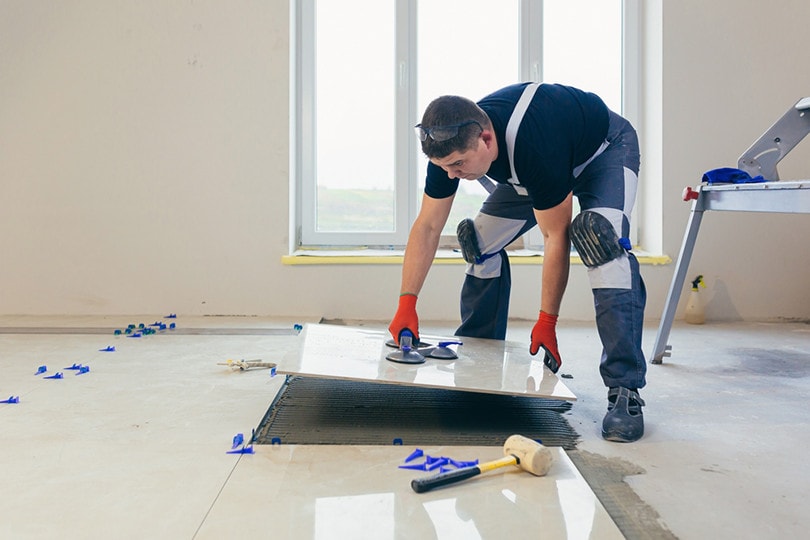
Advantages of Porcelain Tiles
Porcelain tiles have many advantages that make them a popular choice for flooring, countertops, and wall coverings. They are extremely durable and resistant to staining, scratching, and fading. Porcelain tiles are also easy to clean and maintain.
Porcelain tiles come in different colors, styles, and textures, so you can find the perfect look for your home. They can also be useful in different settings, both indoors and outdoors.
- Porcelain tiles are very durable and strong. They won’t scratch or stain easily and are resistant to fading.
- Porcelain tiles are easy to clean and maintain. Just sweep or vacuum them regularly and mop with a mild soap and water solution when necessary.
- Porcelain tiles are available in many colors, styles, and textures. You can find the perfect look for your home whether you’re going for a classic or modern aesthetic.
- You can use porcelain tiles in various settings, both indoors and outdoors. They’re perfect for high-traffic rooms like kitchens and bathrooms as well as outdoor spaces like patios and pool decks.
- Porcelain tiles are a more expensive option than ceramic tiles, but they’re worth the investment because of their durability and beauty.
If you’re looking for a high-quality, stylish, and durable flooring option, porcelain tiles are a great choice. Keep these things in mind when making your decision to ensure you choose the right product for your home.
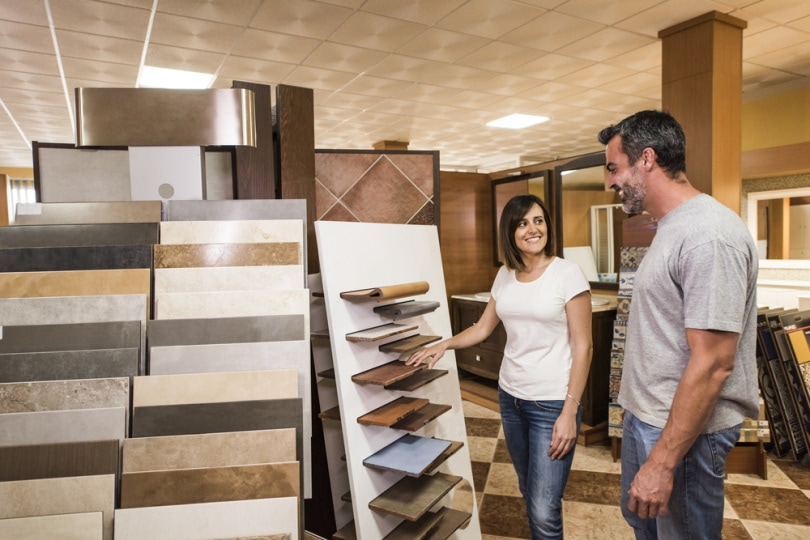
Disadvantages of Porcelain Tiles
Porcelain tiles have a number of disadvantages that you should be aware of before making a purchase. One of the biggest disadvantages is the cost. Porcelain tiles can be quite expensive, especially if you choose to buy designer or hand-painted tiles.
In addition, porcelain tiles are also quite difficult to install, so you will need to hire a professional if you want them installed properly. Finally, porcelain tiles can be quite slippery when wet, so they may not be the best choice for areas that get a lot of foot traffic.
Frequently Asked Questions (FAQs)
What are porcelain tiles?
Porcelain tiles are a kind of ceramic tile, though they are made from a more refined clay and fired at higher temperatures. This makes them denser, harder, and less porous than other ceramic tile types.
What are some benefits of porcelain tile?
Porcelain tile is strong, durable, and ideal for kitchens and bathrooms. It is also resistant to staining and fading and is easy to clean. Porcelain tile is also a good choice for floors that will be exposed to sunlight, as it will not fade over time.
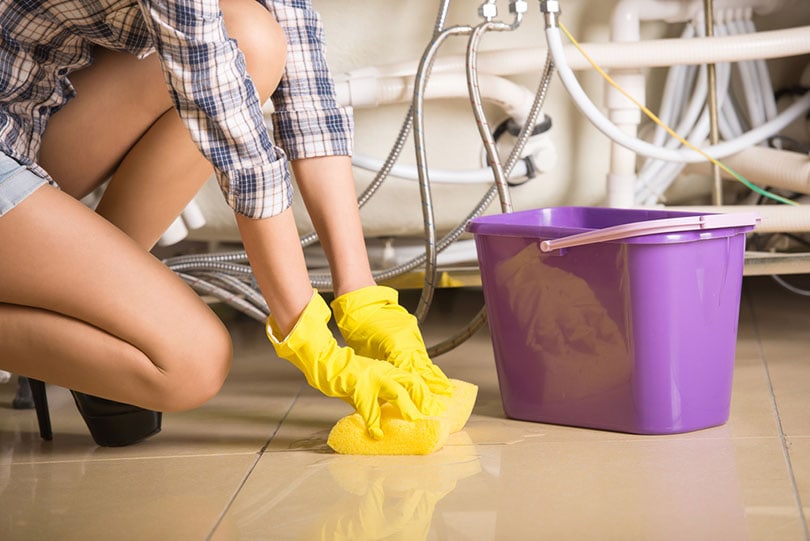
What are the drawbacks of porcelain tile?
Porcelain tile is more expensive than other ceramic tile types. It is also harder to cut and install, so it is best left to a professional.
Is porcelain tile right for me?
If you are looking for a strong, durable, and easy-to-clean flooring option for your home, porcelain tile may be the right choice for you. However, if you are on a budget, there are other options available that may be more suited to your needs.
Conclusion
Porcelain tiles are a versatile, durable, and beautiful tile option that you can use in different settings, both indoors and out. If you’re looking for a tile that will stand the test of time and look great doing it, porcelain may be the right choice for you.
Keep in mind, however, that porcelain tiles are a bit more expensive than other tile options, so be sure to factor that into your budget before making your final decision. Thanks for reading!
Featured Image Credit: Sergey Ryzhov, Shutterstock
Contents

